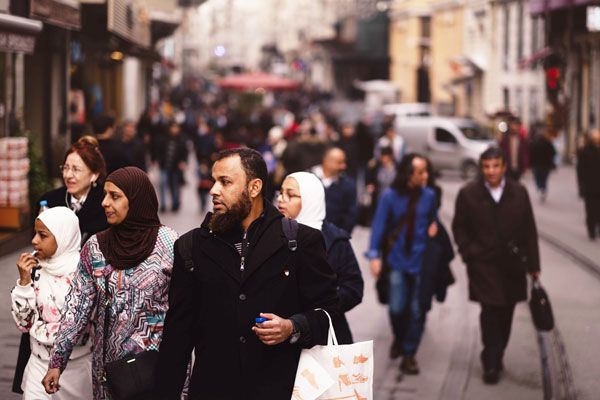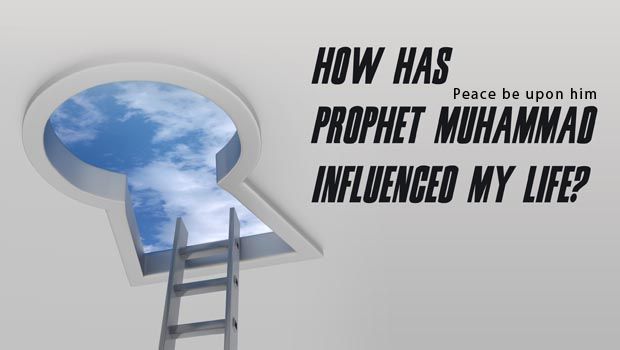The Arabic word hayaa’ is a powerful and rich word with extensive meanings. Loosely translated as “modesty,” hayaa’ is linguistically linked to hayaa (life, to be alive), and the lack of hayaa’ is a lack of life in one’s spiritual heart. Hayaa’ conveys dignity, modesty in thought, character, and appearance, and it reflects true faith. It includes the soul’s discomfort with a shameless or immoral deed or situation, and it compels the believer to abstain from indecent actions, so common and pervasive in the world today, online and offline.
To have modesty, thus, is to restrain oneself from shameful, prohibited acts provoked by base desires, and the trait of hayaa’ distinguishes human beings from animals which act solely out of instinct. Hayaa’ includes the fulfillment of peoples’ rights, a trait that would solve numerous problems of oppression, injustice, and corruption in the world today. The trait of hayaa’ keeps one from sinfulness and is both part of a human’s natural disposition as well as one that is learned through knowledge, reflection, and practice.
Prophet Muhammad (s) reportedly said about Adam and Eve, “Indeed, the believers feel shame before their Lord because of the sins they have committed. Then, by Allah’s bounty, they know how to redeem themselves. They know they can put things right by seeking forgiveness and repenting to Allah” (Mustadrak al-Hakim).
Contrast the trait of hayaa’ with the shameless attitude of some individuals, about whom Allah said, “Whenever they commit a shameful deed, they say, ‘We found our forefathers doing it and Allah has commanded us to do it.’ Say, ‘No! Allah never commands what is shameful. How can you attribute to Allah what you do not know?’ Say, ‘My Lord commands righteousness. Direct your worship straight to Him wherever you pray; call on Him; devote your religion entirely to Him. Just as He first created you, so shall you return’” (Qur’an 7:28-29).
The Numerous Virtues and Blessings of Hayaa’
In Islam it is known that hayaa’ has numerous virtues and blessings, including the following:
A key to goodness — Hayaa’ is the key to all that is good, and it opens for individuals and society the doors of great spiritual elevation, dignity, and success. As one scholar said, hayaa’ is “among the greatest qualities, the greatest status, and the most beneficial” (Ibn al-Qayyim).
Hayaa’ is iman (belief/faith) — The Prophet (s) said, “Hayaa’ and belief are paired together; if one vanishes, then the other vanishes too” (al-Hakim). He (s) also said, “Iman has some sixty or seventy branches. The best of them is la ilaha illa Allah [the shahadah], and the least of them is the removal of harm from the path; and hayaa’ is a branch of belief” (Bukhari).
Prophet Suleiman (s) is reported to have said: “Hayaa is the structure of belief. If the structure is undone, all that is in it is lost” (Adaab al-Shari’ah, 277). Prophet Muhammad is reported to have said, “Hayaa’ is from belief, and belief leads to Paradise” (Tirmidhi).
Hayaa’ is an attribute of Allah — Allah (SWT) is al-Hayiyy’ and as-Sitteer (the one who conceals something). Prophet Muhammad (s) said, “Allah is hayiyy’ and generous. When people raise their hands to Him (in du’a), it is beneath His dignity to send them back unfulfilled and disappointed” (Abu Dawud). “Allah is hayiyy and sitteer; He loves hayaa’ and concealment…” (Abu Dawud). At the same time, we keep in mind that “There is nothing like Him…” (42:11). While Allah (SWT) is described as Hayiyy’, our attempt to exemplify modesty does not resemble the attribute of God. We aim to conform to the attributes Allah commands of us, such as mercy, generosity, strength, beauty, and modesty. As one scholar said, “If anyone has hayaa’ towards Allah when obeying Him, Allah has hayaa’ towards them when they sin” (Madarij as-Salikeen).
Hayaa’ is the Shari’ah of all prophets — “Among the early prophetic teachings that reached people is if you do not have hayaa’, then do as you please” (Bukhari). This famous hadith emphasizes that modesty is a universal prophetic teaching to all of mankind, taught by prophets throughout the millennia, and yet we are always in need of its revival in society. This hadith is not a command but rather a threat of consequences. In reality, the one who has no hayaa’ is going to do as they desire, even if it is harmful to their individual soul, to another person or persons, or to all of society. The revival of hayaa’, thus, is a revival of a teaching of all prophets.
Hayaa’ is the quality of Islam — Prophet Muhammad (s) said, “Verily, every religion has a character, and the character of Islam is hayaa’” (Ibn Majah). Hayaa’ can be observed in the character of Prophet Muhammad, his wives and family members, his companions, and his greatest followers. One companion reportedly said, “Whoever has no shame before others has no shame before Allah” (Ibn Masʿūd). A great scholar of Qur’anic exegesis in later centuries said, “If the only benefit Muslims gain from other Muslims is hayaa’ that prevents them from sinning, then that is sufficient for them” (Ibn Kathīr).
The Loss of Hayaa’ in Our Contemporary World
Today, one observes the loss of hayaa’ in many parts of society, online and offline, with the simultaneous rise of subjective morality and self-worship. In practice, hayaa’ is disappearing so emphasis is put on superficial standards of beauty, vanity, and ego. Nudity has become rampant in all forms of entertainment (even for youth and children, at times), and profanity and inappropriate language has increased. There is the disappearance of etiquette and proper guidelines between the genders, and a “don’t judge me” mentality that sometimes translates to “don’t make me feel ashamed for what I’m doing.” There is also the increase in private communications and interactions that lead to prohibited relationships (or even cheating on the spouse and the resulting destruction of marriage), and so on and so forth.
There is also an increasing sentiment among secular-influenced individuals today that everyone is to be “accepted exactly as they are” in the moral sense, even if what they’re doing is harmful to themselves and others. Acceptance of people isn’t equivalent to acceptance of immorality and self-destruction. One should ideally be accepting of people for who they are, being kind to them and wishing well for them. But that does not negate striving to help them overcome immorality, as we are all, at one time or another, in need of support and guidance in this life. There is nothing embarrassing about hoping for others to be guided to what is good, rather than accepting immorality as the standard for humanity. Ultimately, many of the problems in the world today stem from the loss of hayaa’, and many marriages are destroyed due to the loss. Many young believers end up in misguided and destructive lifestyles due to the loss of hayaa’.
Islam Establishes and Revives Hayaa’
Islam, on the other hand, as a criterion for objective moral values, includes hayaa’ and all decent and wholesome beliefs, values, attitudes, and standards. Islam offers a healthy, comprehensive system of life that channels feelings, thoughts, and desires to the healthiest output in action – one that is truly modest, for men and women, and for all of civilization, and one that is pleasing to Allah. Islam emphasizes guidelines and obligations in various societal interactions to preserve the hayaa’ of all generations. Some Muslims narrow down the consideration of hayaa’ to something like a college student struggling to avoid an interaction in private with someone of the opposite gender. But hayaa’ is not only about avoiding cyber-khalwa (private interactions of two individuals of the opposite gender) or late-night texts, or unnecessary conversations. It’s about protecting the two individuals and their loved ones for generations to come. Hayaa’ is about using the internet and all that it offers in a modest manner, knowing that Allah is watching. While we can recognize and utilize worldly advancements in technology, we also have to protect civilization and humanity’s future from the loss of hayaa’.
Ultimately, what Islam offers is timeless, and yet because of society’s changing standards today and the predominant spread of secular values, Muslims will oftentimes feel like outcasts for exemplifying the beautiful standard of hayaa’. At times, even, Muslims may be mocked or insulted for living with modesty. However, for the sake of Allah, and for the sake of protecting society for generations to come, believers must hold on to hayaa’ and all the beauty of character that comes with it. For sure, modesty is a safeguard of virtue for the individual, the married couple, the family, and society.






